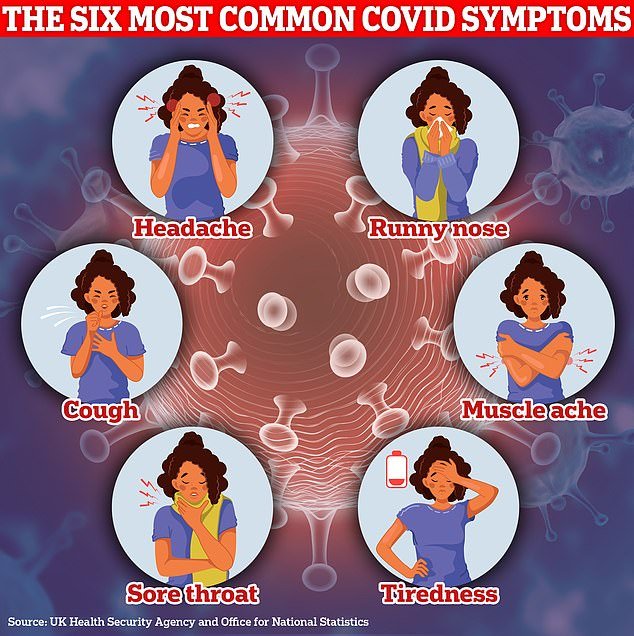Research shows that one in twenty people infected with mild Covid-19 during the first wave of the pandemic continued to have persistent symptoms up to three years later.
US scientists found that respiratory and neurological problems are the most common problems still reported by those affected by the virus in 2020.
And the researchers, who followed more than 135,000 Americans with Covid, also found a 34 percent higher risk of problems with all organs among people hit hardest by Covid and hospitalized.
Experts today called the findings an “important new lesson” and warned that the virus “should not be downplayed.”
Dr. Ziyad Al-Aly, a clinical epidemiologist at Washington University and senior author of the study, said: ‘We are not sure why the effects of the virus last so long.
‘It may have to do with viral persistence, chronic inflammation, immune disorders or all of the above.
‘We tend to think of infections as short-term illnesses with health effects that manifest around the time of infection.
‘Our data challenges this idea. “I feel like Covid continues to teach us – and this is an important new lesson – that a brief, seemingly innocent or benign encounter with the virus can still lead to health problems years later.”
He added: ‘Tackling this knowledge gap is critical to advancing our understanding of long Covid and will help inform care for people suffering from long Covid.’
US government data shows that up to 10 percent of people infected with the virus have been dealing with Covid for a long time.
Often self-diagnosed, the term was coined for a range of symptoms following a Covid infection, which can persist for months or even years after the initial infection.
Around 1.9 million people in Britain are said to suffer from it, with the term encompassing everything from fatigue and shortness of breath to muscle and joint pain.
The researchers analyzed data from 114,000 veterans with mild Covid who did not require hospitalization, more than 20,000 patients hospitalized with the virus and 5.2 million veterans who never received a Covid diagnosis.
They all took part in the study between March and December 2020.
During a three-year follow-up, they found that the risk of long-term Covid-19 one year after infection was 23 percent.
After two years this has fallen to 16 percent, or about one in six.
Worryingly, they also found that among those not hospitalized, Covid had contributed to 10 years of healthy life lost per 1,000 people, three years after infection.
By comparison, those hospitalized with Covid had lost 90 years of healthy life per 1,000 people.
In the US, heart disease and cancer cause about 50 years of lost healthy life, while stroke contributes about 10 years per 1,000 people.
Writing in the diary, Naturopathythe researchers said: ‘While preventing serious illness is important, strategies are also needed to reduce the risk of post-acute and long-term health loss in people with mild Covid.’
However, they also acknowledged that the study primarily included veterans who were “largely older,” white and male and may not reflect other populations.
Participants also contracted the virus in 2020 – an era that predated Covid vaccines – suggesting their infection may have been more severe.
Dr. Al-Aly added: “Covid is a serious threat to people’s long-term health and well-being and should not be downplayed.
‘Even in three years you may have forgotten Covid, but not you.
‘People may think they are out of the woods because they had the virus and experienced no health problems.
‘But three years after infection, the virus can still wreak havoc and cause illness or disease in the intestines, lungs or brain.’
It comes as the number of Covid cases in the UK continues to slowly increase after infections fell in the spring.
Earlier this month, health chiefs issued a warning about a new variant, nicknamed FLiRT, that they had started monitoring.
It currently accounts for around 30 per cent of new cases in Britain.
FLiRT also accounts for about a quarter of new cases in the US, surveillance data shows.
Virologists use the term FLiRT to describe a family of different variants: KP.2, KP.3, JN.1.7, JN.1.1 and KP.1.1.
They are all descendants of the JN.1 variant that has been dominant in Britain in recent months. That itself was called Juno.
Ministers have repeatedly said they will not resort to imposing lockdowns unless there is a doomsday scenario.
A wall of immunity among the population – built up through repeated waves of infections and the rollout of vaccines – has given officials the confidence to make pandemic-era measures a thing of the past.
Spikes in Covid cases could still cause mass illness across the country, wreaking havoc on schools, healthcare and public transport.
Officials are also no longer tracking the prevalence of the virus in the same way they used to, as part of the government’s ushering in of pre-Covid normalities.

The latest ONS data on Covid infections shows that more than 80 per cent of Britons suffer from a runny nose when infected. A loss of taste or smell – one of the original signs of the virus – accounts for just under a fifth of all recorded symptoms


It comes as the number of Covid cases in the UK continues to slowly increase after infections fell in the spring. Earlier this month, health chiefs issued a warning about a new variant, nicknamed FLiRT, that they had started monitoring. It currently accounts for around 30 per cent of new cases in Britain


Often self-diagnosed, the term ‘long Covid’ was coined for a range of symptoms following a Covid infection, which can persist for months or even years after the initial infection. Around 1.9 million people in Britain are said to suffer from it, with the term encompassing everything from fatigue and shortness of breath to muscle and joint pain



